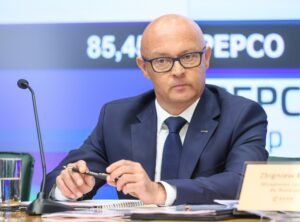The “Charge it: e-mobility now!” conference organised by Eurelectric and the Polish Electricity Association (PKEE) took place at the Hotel de la Poste in the Molenbeek district of Brussels – a multicultural place managed so that it becomes a centre of business; it’s hard to think of a better place for talking about the new technologies.
Brussels’ problems
Brussels is an exceptional city – a cosmopolitan capital of Belgium and Europe, where people speaking many languages may be heard at seen at every corner. According to the Eurosceptics – a source of all evil, always jammed with traffic and with always something important happening. Even from the perspective of Warsaw, the pace of life here is extremely fast, but long-time residents say they got used to it. However, the innovative electromobility may paradoxically turn out to be the thing that will bring a bit of normalcy here.
Pascal Smet, Minister for Mobility and Public Works, the Brussels Capital Region, is an electromobility enthusiast himself. “When my generation was growing up, owning a car was a symbol of freedom, you could drive yourself to a party or your girlfriend. However, once everyone can afford a car, problems begin – the air pollution comes around and the traffic jams and noise become unbearable” – said Mr Smet. He argued that the problem is not at all a too low capacity of the road network, as it is being expanded to the required extent. It is about switching to public transport. “In Brussels, we will increase the investments in the city transportation but we will no longer be buying the diesel engine powered vehicles. We will be buying electric bicycles and buses, modern trams or metro trains – said the local government representative.
Support versus the potential
Concerning the electric buses, Håkan Agnevall, President of Volvo Buses had a lot of interesting things to tell. This type of vehicles already makes up 10 percent of the entire business of the company, and this share has recently been significantly growing. “The global leader in electric bus production and demand is China. Transport electrification opens up totally new possibilities, with noise reduction being just one of the benefits.
The transport is responsible for a quarter of the total carbon dioxide emissions. Mr Agnevall argued that regardless in what country, the electromobility will contribute towards meeting the climate goals. “Different countries have different energy mixes; it would be optimal for the electric vehicles to be fed with energy from the renewable sources, but we also know that if in a country a part of electricity is still generated from fossil fuels, the CO2 emissions reduction will also be significant” – he said.
He was echoed by Antonio Espinosa, head of Iberdrola Distribution – “Europeans want to have electric cars. We are building an electric vehicles charging network in the biggest cities and along the highways. However, we still need State aid for this as the development of charging stations still is not profitable” – he said.
In Desert and Wilderness with an EV
Mette Hoe of Copenhagen Electric seemed to be of a different opinion – “Introduction of the electromobility requires an ongoing consistent policy of the state. This means a legislation that fosters the development of the new technologies, but also a financial support. However, subsidies are a good start but cannot continue forever” – she noted. Her fellow practitioner, Petr Dolejsi from ACEA has, in turn, stressed that no immediate effects should be expected as a result of the legal acts implemented just recently. “Electromobility is a process. Electric vehicles are expensive with half of their price being the batteries. We will not invent a perfect and cheap battery overnight” – he said.
In turn, traveller Arkady Fiedler from Poznań (the grandson of the famous Polish traveller and writer – editor’s note) has described his electric car journey through Africa. He drove from north of Morocco along the west coast of the continent through the Sahara, around the Gulf of Guinea as far as the Democratic Republic of the Congo. He has described the interesting adventures along the way, but there is only one conclusion – where there’s a will there’s a way. If a Nissan Leaf on Polish number plates can make it through the desert and the wilderness, then building a charging infrastructure in Europe should not be a hard thing to do.
Forcing happiness
The Brussels Minister of Mobility Pascal Smet was quite right when he talked about the pioneering solutions and their social costs – “When I was forcing the introduction of trams in Brussels, everyone was saying it was nuts, pure nonsense. Now, after all these years, everyone in Brussels is taking the tram. Sometimes you have to force the happiness on people. And this is the case with the electromobility – said Mr Smet.








